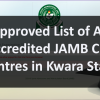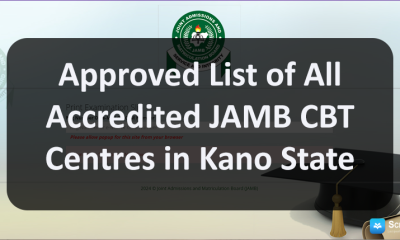Educational Terms
What is JAMB? How it Works & Everything You Need to Know
In the world of academia, terms and acronyms fly around faster than a student late for class. However, few are as prominent and crucial as JAMB in Nigeria. So, what is JAMB, you may ask? Stick around as we take you on an enlightening journey.
What is JAMB?
JAMB stands for Joint Admissions and Matriculations Board, a Nigerian entrance examination board for tertiary-level institutions. JAMB conducts the Unified Tertiary Matriculation Examination (UTME) and Direct Entry (DE) for prospective undergraduates into Nigerian universities.
Don’t miss: JAMB Related News & Information
What is the JAMB UTME?
The Unified Tertiary Matriculation Examination (UTME) is a computer-based standardized examination conducted by the Joint Admissions and Matriculation Board (JAMB) in Nigeria.
This exam serves as a prerequisite for admission into undergraduate programs at Nigerian tertiary institutions, which include universities, polytechnics, and colleges of education.
The UTME assesses candidates’ academic knowledge and readiness for higher education.
The examination consists of four subjects, with English Language being compulsory for all candidates, while the other three subjects depend on the course a candidate intends to study.
The test is scored on a scale from 0 to 400, with each subject contributing a maximum of 100 points.
What is the JAMB DE Form?
The JAMB Direct Entry (DE) Form is an application form for students who wish to apply for direct entry admission into Nigerian tertiary institutions.
Direct Entry is a system of admission that allows candidates with advanced qualifications beyond the secondary school level, such as the National Diploma (ND), Higher National Diploma (HND), NCE, IJMB, or a university degree, to gain admission directly into the 200 level (second year) of a degree program, bypassing the first year.
The Direct Entry Form is different from the Unified Tertiary Matriculation Examination (UTME) form. While the UTME form is for candidates applying for 100 level (first year) admission after secondary school, the Direct Entry form is for those with higher qualifications seeking to start from the 200 level.
But there’s more to JAMB than meets the eye.
What is JAMB Syllabus?
The JAMB Syllabus is a document or guide that provides detailed information about the topics and subtopics that candidates are expected to cover for each subject in preparation for the Unified Tertiary Matriculation Examination (UTME).
The syllabus is designed by the Joint Admissions and Matriculation Board (JAMB) to help candidates understand the scope of their study for the UTME.
History of JAMB
Just like Rome, JAMB wasn’t built in a day. The board’s inception in 1978 came after a series of educational reforms.
JAMB has been a critical part of Nigeria’s educational system, helping streamline the admission process into higher institutions.
Isn’t it fascinating how a single organization has influenced countless students’ futures over several decades?
So, why was JAMB created?
Purpose of JAMB
The Joint Admissions and Matriculation Board (JAMB) was created to handle the admissions process into Nigerian tertiary institutions, such as universities, polytechnics, and colleges of education.
Prior to its creation, each institution managed its own admissions, leading to inconsistency and potential biases in the process.
JAMB was established in 1978 by the Nigerian government with the aim to:
- Ensure a uniform standard: By handling all admissions, JAMB can ensure that every student meets the same minimum requirements, creating a more consistent standard of education.
- Provide equal opportunities: With one centralized system, every student has an equal chance of being admitted to their chosen institution, regardless of their background or connections.
- Improve efficiency: With one body handling all admissions, the process becomes much more efficient.
- Control admission numbers: With all admissions going through one body, it is much easier for the government to control the number of students being admitted to tertiary education each year. This helps to manage the resources of the educational sector more effectively.
To achieve these aims, JAMB conducts a standardized examination known as the Unified Tertiary Matriculation Examination (UTME).
This exam tests candidates’ knowledge in English Language (which is compulsory for all), and three other subjects relevant to the proposed course of study.
The scores from this exam are used to determine admission into tertiary institutions.
Structure of JAMB Examinations
JAMB’s organizational structure is like a well-oiled machine, with its Registrar at the helm. The Registrar, appointed by the Nigerian President, oversees JAMB’s day-to-day operations. Meanwhile, various directors manage specific departments such as examinations and admissions.
Now, let’s take a closer look at JAMB’s examination structure.
1. UTME
The UTME is a computer-based test conducted annually for students who have completed their secondary education. It’s a vital step, like a bridge leading student from secondary school to their university dreams!
2. Direct Entry
For those seeking admission into the second year of a university program, JAMB offers the Direct Entry scheme. It allows students with certain qualifications to bypass the first year of studies, like jumping a step on a staircase!
How Does JAMB Work?
Registration Process
Understanding the JAMB registration process is akin to learning the rules of a new board game.
It involves purchasing a JAMB form, filling out personal details, selecting a course, and choosing preferred institutions. Remember, without proper registration, you can’t join the game!
Scoring System
The JAMB scoring system is fairly straightforward. Each question carries equal marks, and the maximum score is 400. It’s like running a race where every step you take counts equally towards the finish line!
Result Checking
After the examination, results are usually released within two weeks. Accessing your result is as easy as pie, just a few clicks on the JAMB website. It’s like opening a letter, with the anticipation of what’s inside!
Preparing for JAMB Examinations
Study Materials and Resources
Preparing for JAMB exams? There are numerous study materials available, from textbooks to online resources. It’s like having a roadmap to guide you on a journey, ensuring you don’t get lost!
Read more: How to Prepare for JAMB UTME Exams [Ultimate Guide]
Tips and Tricks
Don’t you just love the idea of secret tips and tricks that can help you succeed? With JAMB, strategies such as understanding the exam pattern, practicing past questions, and effective time management can make a significant difference. It’s like having a secret recipe to bake the perfect cake!
Importance of JAMB
The importance of JAMB cannot be overstated. It is the gateway to higher education in Nigeria, shaping the academic future of millions of students. Doesn’t it seem like a powerful key, unlocking countless doors of opportunities?
Here are some reasons why JAMB is important:
- Uniformity and Standardization: JAMB ensures uniformity and standardization in the admission process across all tertiary institutions in the country. This helps maintain an equal standard of knowledge among students admitted into different institutions.
- Fairness and Equity: By centralizing the admission process, JAMB reduces the risk of bias and favoritism, ensuring that admissions are based purely on merit. Every candidate, regardless of their background or connections, has an equal opportunity to gain admission into a tertiary institution.
- Quality Assurance: The Unified Tertiary Matriculation Examination (UTME) administered by JAMB tests the readiness of students for higher education. It ensures that only qualified candidates gain entry into tertiary institutions, thereby maintaining the quality of education.
- Resource Management: JAMB helps in effective planning and management of educational resources. By controlling admission numbers, the government can better manage the capacity of educational institutions and the allocation of resources.
- Data Management: JAMB collects, processes, and stores a huge amount of data about candidates seeking admission into tertiary institutions. This data can be used for research, policy development, and tracking the progress of the educational sector over time.
- Educational Policy Implementation: JAMB plays a crucial role in implementing the government’s educational policies, particularly those related to admissions into tertiary institutions.
JAMB plays a vital role in ensuring a fair, standardized, and efficient admission process into Nigerian tertiary institutions, which ultimately helps to improve the quality of education in the country.
JAMB FAQs
[accordions title=”JAMB FAQs”] [accordion title=”1. What does JAMB stand for? ” load=”show”]JAMB stands for the Joint Admissions and Matriculation Board.[/accordion] [accordion title=”2. What is the purpose of JAMB? ” load=”hide”]JAMB oversees university admissions in Nigeria, ensuring they are fair and standardized.[/accordion] [accordion title=”3. What is the JAMB UTME? ” load=”hide”]The JAMB UTME is a computer-based test for prospective undergraduates applying to Nigerian universities.[/accordion] [accordion title=”4. Who can register for JAMB? ” load=”hide”]Anyone intending to pursue undergraduate studies in Nigeria can register for JAMB.[/accordion] [accordion title=”5. How does one register for JAMB? ” load=”hide”]One can register for JAMB through their official website, where they will create a profile, pay the registration fee, and schedule their exam.[/accordion] [accordion title=”6. What is the JAMB syllabus? ” load=”hide”]The JAMB syllabus is a comprehensive guide outlining the subjects and topics to be studied for the UTME.[/accordion] [accordion title=”7. What is the passing mark for JAMB examinations?” load=”hide”]The minimum cut-off mark varies between institutions and courses, but typically it ranges from 120-200.[/accordion] [accordion title=”8. How often is the JAMB exam conducted?” load=”hide”]JAMB examinations are conducted annually.[/accordion] [accordion title=”9. Can I change my course or institution after registration?” load=”hide”]Yes, JAMB allows candidates to change their course or institution after registration.[/accordion] [accordion title=” 10. How can I prepare effectively for the JAMB exam?” load=”hide”]Consistent study, understanding the exam pattern, using past questions for practice, and good time management are key strategies.[/accordion] [accordion title=”11. How long does the JAMB result remain valid?” load=”hide”]JAMB results are valid for a year from the date of the exam.[/accordion] [/accordions]Conclusion
So, there you have it! From its origins to its workings, we’ve unraveled the mystery of what is JAMB. Remember, the key to conquering JAMB lies in understanding its purpose and making the most of its resources. And with this guide, you’re well on your way to doing just that.
Good luck, future undergraduates! Your journey is only just beginning.
In a nutshell, JAMB plays an instrumental role in Nigeria’s education system, bridging the gap between secondary school and university education. Like a lighthouse guiding ships, JAMB shines its light, leading students towards their university aspirations.
Definitions by School News
The definition provided on this webpage is an authentic definition. If one intends to make a reference to this page or cite the provided definition, it is permissible to do so, but it is requested that proper attribution be given to us.
Our objective is to explain complicated educational terms in a way that is easy to understand. Each definition we publish stands out for its high accuracy and simplicity. If you have feedback about the definition or would like to suggest a new educational term, please contact us.
See what others are reading:

















